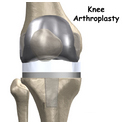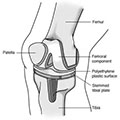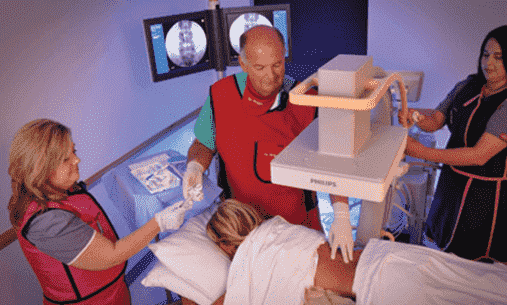Both Knee Replacement Together
Both Knee Replacement (Bilateral) Together in IndiaKnee replacement surgery is the most common joint replacement procedure. Many people have knee arthritis, but it can be difficult to know when the right time to have a knee replacement surgery is. Furthermore, there is confusion about what to expect from knee replacement surgery. Do you have questions? Look no further. You can find all you need to know about knee replacement surgery right here.
Connect with Knee replacement surgeons hospital for special surgery. Now it’s possible to both knee replacement surgery at same time. Knee replacement cost India is very cheap.
What Is Knee Arthritis?
 The word 'arthritis' means 'inflammation of the joint.' Most people think of arthritis as the wearing away of cartilage in a joint - this is the end result of inflammation within the joint. Over time, the inflammation can lead to cartilage loss and exposed bone, instead of a normal, smooth joint surface.
The word 'arthritis' means 'inflammation of the joint.' Most people think of arthritis as the wearing away of cartilage in a joint - this is the end result of inflammation within the joint. Over time, the inflammation can lead to cartilage loss and exposed bone, instead of a normal, smooth joint surface.
The most common type of knee arthritis is osteoarthritis. This is often referred to as "wear-and-tear" arthritis, and it results in the wearing away of the normal smooth cartilage until bare bone is exposed. Other types of arthritis include rheumatoid arthritis, gouty arthritis, and lupus arthritis.
Am I Ready for Knee Replacement? Knee replacement surgery is a procedure that is performed when the knee joint has reached a point when painful symptoms can no longer be controlled with non-operative treatments. In a knee replacement procedure, your surgeon removes the damaged joint surface and replaces it with a metal and plastic implant.
A total knee replacement is a major surgery, and deciding to have the surgery done is a big decision. Here are some signs to look for to help you decide if the time is right, or not right, for knee replacement surgery.
Steps of a Knee Replacement Surgery
 When a knee replacement is performed, the bone and cartilage on the end of the thigh bone (femur) and top of the shin bone (tibia) are removed. This is performed using precise instruments to create surfaces that can accommodate the implant perfectly. A metal and plastic knee replacement implant is then placed in to function as a new knee joint. Depending on the condition of the cartilage underneath the kneecap, the kneecap surface may also be replaced.
When a knee replacement is performed, the bone and cartilage on the end of the thigh bone (femur) and top of the shin bone (tibia) are removed. This is performed using precise instruments to create surfaces that can accommodate the implant perfectly. A metal and plastic knee replacement implant is then placed in to function as a new knee joint. Depending on the condition of the cartilage underneath the kneecap, the kneecap surface may also be replaced.
Risks of a Knee Replacement
Knee replacement surgery has become quite common, but there are still risks. Fortunately, well over 90% of patients who undergo knee replacement surgery have good results.
You should have a thoughtful discussion with your doctor prior to total knee replacement surgery and make sure to have your questions answered.
- Blood Clots
- Blood Loss
- Infection of a Joint Replacement
- Stiffness of the Knee Replacement
Need A Knee Replacement ?
Considering knee replacement surgery? If yes, sign up for this 7 week e-course. Each week, you'll receive a newsletter devoted to issues surrounding total knee replacement surgery. Topics covered include why knee replacements are done, alternatives to surgery, how the surgery is performed, and what the rehab is like. At the end of 7 weeks, you'll have a firm understanding of this procedure.
Bilateral knee replacement surgery means that both knees are replaced. Patients who have severe knee arthritis in both knees may be good candidates to undergo bilateral total knee replacement. In general, there are two types of bilateral knee replacement surgery:
- Simultaneous Bilateral Knee Replacement : - A simultaneous procedure means that both knees are replaced at the same surgery, in one day.
- Staged Bilateral Knee Replacement : -A staged procedure means that the knees are both replaced, but not on the same day. The second surgery may be performed as early as several days after the initial surgery, or several weeks or months later.
What are the benefits of a bilateral knee replacement?
The benefit of simultaneous knee replacement is that both problems are taken care of at one time. The overall rehabilitation is a shorter time, and there is only one hospitalization. Patients also only require one anesthesia.
Is having a bilateral knee replacement my decision to make?
Yes and no. Patients who are appropriate candidates for a simultaneous knee replacement can decide if they want both surgeries at the same time. However, your doctor may recommend against a simultaneous procedure if you have medical conditions that may place you in a higher risk category.
Alternatives to Knee Replacement
 Treatment should begin with the most basic options and progress to the more involved, which may include surgery. Not all treatments are appropriate for every patient.
Treatment should begin with the most basic options and progress to the more involved, which may include surgery. Not all treatments are appropriate for every patient.
Knee replacement is generally reserved for patients who have tried all of the other treatments and are still left with significant pain during normal activities. Patients who have occasional pain, are able to participate in athletic activities, or have not tried non-operative treatments are probably not ready for a knee replacement. Non-operative treatment options include:
- Weight Loss
- Activity Modifications
- Anti-Inflammatory Medications
- Joint Supplements
- Cortisone Injections
- Hyaluronic Acid (e.g. Synvisc) Injections
Knee Replacement Implants
 Knee replacement surgery removes the damaged joint lining and replaces the joint surfaces with a metal and plastic implant that functions similar to a normal knee. These implants will wear out over time, and knee replacements are done infrequently in younger patients because of the concern of the implant wearing out too quickly.
Knee replacement surgery removes the damaged joint lining and replaces the joint surfaces with a metal and plastic implant that functions similar to a normal knee. These implants will wear out over time, and knee replacements are done infrequently in younger patients because of the concern of the implant wearing out too quickly.
Knee replacement implants have been modified in order to provide the best possible functioning with long-lasting results. This effort to perfect knee replacement implants is constantly taking place. Some newer implants have promise, others may not turn out to be better.
- Partial Knee Replacements
- Rotating Knee Replacements
- Gender Specific Knee Replacements
- Custom Knee Replacements
Knee Replacment Rehabilitation
 Knee replacement surgery is very successful, but the success of the procedure is partly due to the rehabilitation period that follows the surgery. For patients to expect a good result from knee replacement surgery, they must be an active rehab participant.
Knee replacement surgery is very successful, but the success of the procedure is partly due to the rehabilitation period that follows the surgery. For patients to expect a good result from knee replacement surgery, they must be an active rehab participant.
Rehabilitation after knee replacement begins immediately. Patients will work with a physical therapist as soon as the surgical procedure has been performed. The emphasis in the early stages of rehab is to maintain motion of the knee replacement and to ensure that the patient can walk safely. The body reacts to surgery by making scar tissue, and patients may never recover normal motion if they do not focus on bending and straightening their knee replacement.
Who should consider bilateral knee replacement?
Patients who have severe knee arthritis in both knees may be candidates for bilateral knee replacement surgery. The same criteria used to determine if a single knee requires replacement are used to determine if both should be done:
What are the risks of a simultaneous bilateral knee replacement?
There are concerns about performing a simultaneous knee replacement because it is a longer surgery and is more demanding on the body. Because of this, patients who have cardiovascular problems, pulmonary disease, or are over the age of 80 are often advised against a simultaneous knee replacement procedure.
Studies have shown patients undergoing simultaneous knee replacement have a slightly higher risk of cardiac events and needing blood transfusion. Overall, the risk of severe complications such as infection, blood clots, pulmonary embolism or death is about the same for both simultaneous and bilateral procedures.
Another disadvantage of the simultaneous knee replacement is that the early rehabilitation can be more difficult as patients do not have a "good leg" to work with.
Can partial knee replacement be done as a bilateral procedure?
Yes. The same criteria are used to determine if patients who require bilateral partial knee replacement are appropriate to undergo this procedure as a simultaneous surgery.
The list of of Knee Joint Replacement Hospitals in India is as follows : -
- Apollo Hospitals, Bangalore, India
- Apollo Hospital, Chennai, India
- Apollo Hospitals, Hyderabad, India
- Indraprastha Apollo Hospital, Delhi, India
- Apollo Gleneagles Hospital, Kolkata, India
- Apollo Hospital, Goa, India
- Wockhardt Hospital, Bangalore India
- Wockhardt Hospital, hyderabad, India
- Wockhardt Hospital, Mumbai, India
- BGS Global Hospital, Chennai, India
- Fortis Hospital, Delhi, India
- Fortis Hospital, Mohali, India
- Fortis Hospital, Noida, India
- Manipal Hospital, Bangalore, India
- BGS Global Hospital, Hyderabad, India
- MIOT Hospital, Chennai, India
- Sparsh Hospital, Bangalore, India
- Artemis Hospital, Gurgaon ( Delhi ) , India
- Max Devki Devi Heart and Vascular hospital, Delhi, India
- BGS Global Hospital, Bangalore, India
For more information, medical assessment and medical quote send your detailed medical history and medical reports as email attachment to Email : - info@wecareindia.com Call: +91 9029304141 (10 am. To 8 pm. IST) (Only for international patients seeking treatment in India)
We Care Health Services Hospitals
Copyright © 2009 - 2015 We Care India. All Rights Reserved.
Home | About Us | Site Map | Get a Quote | Disclaimer | Advertise With Us | Contact Us


















